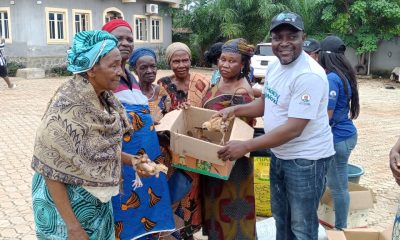COVER
South Korea Plane Crash Claims 179 as Air Canada Skids Runway

By David Torough, Abuja
A Jeju Air plane carrying 181 people from Thailand to South Korea crashed on arrival yesterday, smashing into a barrier and bursting into flames, killing everyone aboard except for two flight attendants plucked from the wreckage.
According to AFP, a bird strike was cited by authorities as the likely cause of the crash — the worst ever aviation disaster on South Korean soil.
Similarly, a PAL Airlines aircraft, operating as Air Canada flight AC2259, executed an emergency landing at Halifax Airport, Canada, following a landing gear malfunction.
The incident, which occurred around 9:30 PM AT, was reported by CBC News yesterday.Passengers on the Jeju Air plane were flung out of the plane and it was “almost completely destroyed”, according to fire officials.
Video showed the Jeju Air Boeing 737-800 landing on its belly at Muan International Airport, skidding off the runway as smoke streamed out from the engines, before crashing into a wall and exploding in flames.
“Of the 179 dead, 65 have been identified,” the country’s fire agency said, adding that DNA retrieval had begun.
Inside the airport terminal, tearful family members gathered to wait for news.
An official began calling out the names of the 65 victims who had been identified, with each name triggering fresh cries of grief from waiting relatives.
Only two people — both flight attendants — were rescued from the crash, the fire department said.
“Passengers were ejected from the aircraft after it collided with the wall, leaving little chance of survival,” a local fire official told families at a briefing, according to a statement released by the fire brigade.
Both black boxes — the flight data recorder and the cockpit voice recorder — have been found, deputy transport minister Joo Jong-wan said at a briefing.
Under floodlights, rescue workers used a giant yellow crane to lift the burned-out fuselage of the orange-and-white aircraft on the runway at Muan — some 288 kilometres (about 180 miles) southwest of Seoul.
Bits of plane seats and luggage were strewn across the field next to the runway, not far from the charred tail, offering a glimpse into the catastrophic impact of the crash.
‘Mayday’
All of the passengers were Korean apart from two Thais, with the youngest a three-year-old boy and the oldest a 78-year-old, authorities said.
“I had a son on board that plane,” an elderly man waiting in the airport lounge, who asked not to be named, said.
“My younger sister went to heaven today,” a 65-year-old woman, who gave only her surname Jo, said.
Boeing said in a statement that it was in touch with Jeju Air and stood “ready to support them”.
Engulfed in flames
South Korea’s acting President Choi Sang-mok, who only took office Friday, convened an emergency cabinet meeting and then visited the crash site at Muan.
“The entire government is working closely together to manage the aftermath of the accident… making every effort to ensure thorough support for the bereaved families,” he said.
The country declared a seven-day national mourning period effective from Sunday, with memorial altars to be set up nationwide.
It is the first fatal accident in the history of Jeju Air, one of South Korea’s largest low-cost carriers, which was set up in 2005.
On August 12, 2007, a Bombardier Q400 operated by Jeju Air carrying 74 passengers came off the runway due to strong winds at the southern Busan-Gimhae airport, resulting in a dozen injuries.
South Korea’s aviation industry has a solid track record for safety, experts say.
A number of fatal aviation accidents have occurred globally due to bird strikes, which can cause a loss of power if the animals are sucked into the air intakes.
In 2009, a US Airways Airbus A320 famously landed in New York’s Hudson River after bird strikes on both of its engines, in an incident widely known as the “Miracle on the Hudson” because there was no loss of life.
The PAL Airlines aircraft
The PAL Airlines aircraft incident, which occurred around 9:30 PM AT, was reported by CBC News yesterday.
During the landing, the plane skidded along the pavement, triggering panic among passengers.
Nikki Valentine, a passenger onboard, recounted the harrowing experience, describing how the aircraft tilted approximately 20 degrees to the left, accompanied by a loud crash-like noise.
“The plane started to sit at about a 20-degree angle to the left and, as that happened, we heard a pretty loud—what almost sounded like a crash sound—as the wing of the plane started to skid along the pavement, along with what I presume was the engine,” Valentine told CBC News.
Viral footage from the incident captured the aircraft’s wings scraping the runway, causing a fire during the landing. Fortunately, no casualties were reported among passengers or crew.
The emergency landing at Halifax Airport ignited discussions on social media, with users drawing comparisons to a deadly incident in South Korea.
A flight from Thailand to Muan International Airport crashed after veering off the runway and bursting into flames, resulting in 120 fatalities.
“Unbelievable. Thankfully it landed with everyone surviving it appears,” one user remarked about the Halifax incident.
Another expressed concerns over the frequency of aviation mishaps, writing, “Two catastrophic landing gear failures in a matter of hours? What’s happening in aviation right now? Mechanical issues or something more sinister? Questions need answers—fast.”
Adding to the series of recent aviation accidents, an Embraer 190 aircraft operated by Azerbaijan Airlines crashed in Aktau, Kazakhstan, claiming 38 lives while 29 survived.
Deccan Chronicles reported that the flight from St. John’s, Newfoundland, skidded along the runway at Halifax Airport in Goffs, Nova Scotia.
The airport was temporarily closed on Saturday night, though one runway was reopened shortly after.
According to a passenger interviewed by CBC News, one of the aircraft’s tyres failed to deploy properly during the landing, causing the plane to tilt and skid for a significant distance.
“The plane shook quite a bit and we started seeing fire on the left side of the plane and smoke started coming in the windows,” she described.
Emergency crews responded swiftly, ensuring the safety of all onboard.
COVER
FG Approves Mandatory Drug Integrity Test for Tertiary Students

By Attah Ede, Makurdi
In a bold move to tackle the growing menace of drug abuse among young people, the Minister of Education, Dr. Tunji Alausa, has approved the implementation of mandatory drug integrity testing for students in Nigeria’s tertiary institutions.This initiative, announced after a strategic meeting with the Chairman of the National Drug Law Enforcement Agency (NDLEA), Brig.
Gen. Buba Marwa (retd), will apply to both new and returning students through compulsory and random testing.The development is part of a comprehensive three-pronged strategy proposed by the NDLEA, which includes curriculum reform to introduce up-to-date drug education in schools, stand-alone drug abuse prevention programs at the secondary level, and a national student drug testing policy.According to NDLEA spokesman, Femi Babafemi, over 40,000 drug offenders have been arrested and more than 5,500 metric tonnes of narcotics seized in the last two years alone.Marwa emphasized the urgent need for this initiative, stating that drug use fuels criminal activities including terrorism, kidnapping, and banditry.“We are fighting for the souls of our children. Without drugs, many criminal activities would not be possible,” Marwa declared.Dr. Alausa acknowledged the devastating effects of drug abuse on academic performance and employability, describing it as a major threat to national development.“When youths get into drugs, they lose interest in education. Even if they attend school, they’re not functional. Their ability to make informed life decisions is diminished, making them unemployable,” Alausa warned.To institutionalize the reforms, the minister announced the establishment of a Substance Use Prevention Unit in the ministry and the formation of an inter-ministerial working group with the NDLEA. He also committed to collaborating with the Universal Basic Education Commission and the Tertiary Education Trust Fund to support the NDLEA Academy in Jos.Meanwhile, in Makurdi, Benue State, a different kind of crisis is unfolding. No fewer than 76 nursing students at the Benue State University (BSU) were forcefully evicted from their hostels on Thursday, following a dispute over increased accommodation fees.The students, who were relocated from the main campus to the dilapidated facilities of the former School of Nursing and Midwifery, said they were asked to pay N30,000 per bed space, double the N15,000 charged at the main hostels.According to them, the eviction came without prior notice, even as the students were in the middle of their first semester exams and preparing for their clinical postings slated for August 11.Many of them, coming from distant states such as Lagos, Kaduna, and Abuja, were left stranded on the streets with their luggage and no alternative accommodation.Acting President of the Benue Schools of Nursing and Midwifery Alumni Association and media aide to the State NANNM Chairman, Mhange Moses, condemned the action as harsh and insensitive.“This is a shameful treatment. These students live in appalling conditions — no water, no electricity, broken toilets. Now they are being thrown out with no place to go. The nursing college is at risk of losing accreditation, and the students’ futures are in jeopardy,” Moses lamented.He appealed to Governor Hyacinth Alia to intervene urgently and provide a safe and conducive learning environment.“Nurses are the custodians of public health. They deserve better. We appreciate the governor’s efforts in upgrading the institution, but he must act now to prevent further damage,” Moses urged.As the federal government ramps up its fight against drug abuse in tertiary institutions, the plight of these nursing students highlights another pressing issue in the education sector—access to basic, dignified living conditions while pursuing academic and professional training.COVER
FCMB Group Records N529.2bn in Half Year Gross Earnings

By Tony Obiechina, Abuja
FCMB Group Plc has announced its financial results for the half-year period ended June 30, 2025, recording gross earnings of N529.2bn, representing a 41.3 percent increase compared to N374.5bn posted in the corresponding period of 2024.In its unaudited financial statements for the period ended March 31, 2025, and filed with the Nigerian Exchange Limited on Tuesday, the growth was primarily driven by a 70.
3 percent surge in interest and discount income, which rose to N458. 4bn from N269.2bn in H1 2024. This strong performance reflects improved yields on earning assets and expansion in the Group’s loan book, which reached N2.38tn as of 30 June 2025.Net interest income climbed to N207.4bn, up 95.3 percent from N106.2bn in the same period last year. Despite this, interest expense rose by 54.1 percent to N251.0bn, compared to N163.0bn in 2024.Net fee and commission income also rose significantly by 51.3 percent to N37.9bn from N25.1bn. This growth was aided by a 30.9 per cent rise in fee and commission income to N47.4bn, even as fee and commission expenses fell by 14.9 per cent to N9.5bn.However, net trading income declined by 29.3 per cent to N22.2bn from N31.4bn, while other gains fell sharply to N696.3m from N37.1bn, reflecting lower revaluation and disposal gains on financial instruments.Operating expenses increased across the board. Personnel expenses rose 34.4 percent to N48.3bn, and depreciation and amortisation grew 24.8 per cent to N8.1bn, while general and administrative expenses jumped 59.4 per cent to N57.2bn. Other operating expenses rose 49.4 per cent to N39.6bn.Despite these cost increases, the Group delivered a profit before tax of N79.1bn, a 23.2 per cent rise from N64.2bn in H1 2024. After tax, profit stood at N73.4bn, reflecting a 23.4 per cent year-on-year growth from N59.5bn.Other comprehensive income for the period was N6.9bn, up from N24.8bn in the previous year. This brings total comprehensive income for the Group to N80.3bn for H1 2025, slightly below the N84.3bn reported in H1 2024, due largely to lower unrealised gains from foreign currency translation differences.Total assets as of June 30, 2025, stood at N7.54tn. Customer deposits rose 39.9 per cent to N4.54tn, while loans and advances to customers increased modestly to N2.38tn.COVER
NNPCL Backstraps, Rules Out Port Harcourt Refinery Sale

By David Torough, Abuja
The Nigerian National Petroleum Company Limited (NNPCL) has officially ruled out the sale of the Port Harcourt Refining Company, reaffirming its commitment to completing high-grade rehabilitation and retention of the plant.Group Chief Executive Officer of NNPC Ltd, Bayo Ojulari, made the announcement during a company-wide town hall meeting at the NNPC Towers in Abuja, ending weeks of speculation over the future of the country’s most prominent state-owned refining asset.
A statement by the company management yesterday said, “The Nigerian National Petroleum Company Limited has officially ruled out the sale of the Port Harcourt Refining Company, reaffirming its commitment to completing high-grade rehabilitation and retention of the plant.”He described selling the Port Harcourt Refining Company as “ill-advised and sub-commercial.”Ojulari’s remarks come amid rising public concern sparked by his earlier comments at the 2025 OPEC Seminar in Vienna, where he said “all options are on the table” regarding the future of Nigeria’s refineries.The statement triggered a wave of speculation that a sale might be imminent.He stated that the new position of the firm was not a shift. Rather, it is informed by ongoing detailed technical and financial reviews of the Port Harcourt, Kaduna and Warri refineries.The statement added, “The ongoing review indicates that the earlier decision to operate the Port Harcourt refinery, before full completion of its rehabilitation, was ill-informed and sub-commercial.”Although progress is being made on all three, the emerging outlook calls for more advanced technical partnerships to complete and high-grade the rehabilitation of the Port Harcourt refinery.”Thus, selling is highly unlikely as it would lead to further value erosion.”At the town hall, the Executive Vice Presidents presented progress reports from the Upstream, Downstream, Finance, Business Services, Gas, Power, and New Energy businesses, highlighting operational achievements, ongoing reforms, and areas requiring attention.According to the statement, the announcement reinforces NNPC’s mandate as a strategic custodian of national energy infrastructure and reflects a firm resolve to deliver on the complete rehabilitation and long-term viability of Nigeria’s refineries.It also signals continuity in the Federal Government’s broader energy security objectives and a commitment to retaining critical assets under national control.Feedback during and after the session revealed a workforce energised and aligned with the leadership’s vision. Described as “reassuring,” “transformational,” and “sustainable”, the atmosphere reflected an optimistic outlook among employees and hopefulness about the company’s evolving strategic direction.“NNPC Ltd will continue to reposition itself as a commercially driven, professionally managed national energy company, grounded in transparency, focused on performance, and unwavering in its responsibility to its number one stakeholder group, Nigerians,” Ojulari concluded.The statement added that the declaration was received with applause from hundreds of staff attendees, who described the position as a renewed sense of business-focused direction across the organisation.NNPCL Drills Four Oil Wells in Kolmani, BauchiA Director at the Nigerian National Petroleum Company Ltd, Yusuf Usman, said the company has drilled four oil wells in the Kolmani area of Bauchi State.He also restated the commitment of the company to the exploration and development of oil and gas resources in the northern region of the country.Usman said this on Wednesday in Kaduna at the Sir Ahmadu Bello Memorial Foundation’s two-day interactive Session on Government-Citizens Engagement.Usman stated, “So far, the NNPCL has drilled four wells in the Kolmani area of Bauchi State, and is currently evaluating the appropriate technology to be deployed for the next phase of drilling operations.“In support of President Tinubu’s Compressed Natural Gas (CNG) Initiative, five CNG and Liquefied Natural Gas (LNG) plants are under construction in Kogi.“These plants are expected to enhance gas supply and accessibility across the northern region.”Usman highlighted some of the achievements of the company under the Tinubu-led administration that benefited the north and other parts of the country.



















